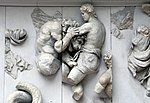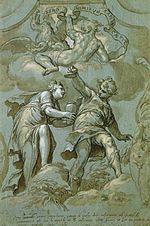Homonoia, (/hoʊmoʊˈnɔɪə/ (Ancient Greek: Ὁμόνοια) in ancient Greek religion, was a minor goddess of concord, unanimity, and oneness of mind. Her opposite... 2 KB (238 words) - 08:34, 1 November 2023 |
together Homonoia (mythology) - Greek goddess of order and unity This disambiguation page lists articles associated with the title Homonoia. If an internal... 327 bytes (67 words) - 22:59, 20 October 2013 |
 | Harmonia (redirect from Harmonia (mythology)) corresponding to the Roman goddess Concordia. Aneris Cadmus et Hermione Eris Homonoia, goddess of concord, unanimity, and oneness of mind Scholia on Homer, Iliad... 12 KB (1,392 words) - 08:15, 17 April 2024 |
Deimos (deity) (redirect from Metus (mythology)) In Greek mythology, Deimos /ˈdaɪmɒs/ (Ancient Greek: Δεῖμος, lit. 'fear' pronounced [dêːmos]) is the personification of fear. He is the son of Ares and... 5 KB (532 words) - 00:13, 3 February 2024 |
In Greek mythology, Algea (Ancient Greek: Ἄλγεα, lit. 'pain, grief') is used by Hesiod in the plural as the personification of pain, both physical and... 4 KB (322 words) - 05:41, 17 February 2024 |
In Greek mythology, Eurybia (/jʊəˈrɪbiə/; Ancient Greek: Εὐρυβία, Εὐρυβίη, meaning "wide-force"), described as "[having] a heart of flint within her"... 3 KB (162 words) - 08:23, 24 June 2023 |
 | Titans (redirect from Titans (mythology)) In Greek mythology, the Titans (Ancient Greek: οἱ Τῑτᾶνες, hoi Tītânes, singular: ὁ Τῑτᾱ́ν, -ήν, ho Tītân) were the pre-Olympian gods. According to the... 85 KB (9,258 words) - 17:17, 11 March 2024 |
 | In Greek mythology, Kratos, also known as Cratus or Cratos, is the divine personification of strength. He is the son of Pallas and Styx. Kratos and his... 27 KB (2,734 words) - 23:49, 21 April 2024 |
In Greek mythology, Mese (/ˈmiːsiː/; Ancient Greek: Μέση) was one of the three Muses of the lyre together with her sisters Nete and Hypate. They were... 2 KB (155 words) - 13:01, 26 February 2024 |
 | In ancient Greek religion and mythology, Iris (/ˈaɪrɪs/; EYE-riss; Greek: Ἶρις, translit. Îris, lit. "rainbow," Ancient Greek: [îːris]) is a daughter... 32 KB (3,127 words) - 10:19, 22 March 2024 |
(1999). Classical Mythology. Oxford University Press. pp. 133–134. ISBN 0195143388. Grimal, Pierre, The Dictionary of Classical Mythology, Wiley-Blackwell... 2 KB (193 words) - 17:44, 3 April 2024 |
 | In Greek mythology, Bia (/ˈbaɪə/; Ancient Greek: Βία [/bí.aː/]; "force, strength") is the personification of force. According to the preface to Fabulae... 7 KB (676 words) - 15:40, 24 February 2024 |
 | In Greek mythology, Dike or Dice (/ˈdaɪkiː/ or /ˈdaɪsiː/; Greek: Δίκη, díkē, 'custom') is the goddess of justice and the spirit of moral order and fair... 11 KB (1,208 words) - 21:08, 5 April 2024 |
 | In Greek mythology, Aether, Æther, Aither, or Ether (/ˈiːθər/; Ancient Greek: Αἰθήρ (Brightness) pronounced [ai̯tʰɛ̌ːr]) is the personification of the... 31 KB (3,284 words) - 22:00, 10 February 2024 |
In Greek mythology, Nerites (Greek: Νηρίτης, romanized: Nērítēs) was a minor sea deity, the son of "Old Man of the Sea" Nereus and the Oceanid Doris and... 6 KB (532 words) - 13:11, 21 February 2024 |
In Greco-Roman mythology, Leuce, also spelled Leuke (Ancient Greek: Λεύκη, "white", specifically "white poplar"), was a nymph and a daughter of the Titan... 7 KB (922 words) - 14:03, 25 November 2023 |
Moros (redirect from Fatum (mythology)) In Greek mythology, Moros /ˈmɔːrɒs/ or Morus /ˈmɔːrəs/ (Ancient Greek: Μόρος means 'doom, fate') is the personified spirit of impending doom, who drives... 4 KB (472 words) - 14:20, 2 March 2024 |
 | Epimetheus (redirect from Epimetheos (mythology)) In Greek mythology, Epimetheus (/ɛpɪˈmiːθiəs/; Greek: Ἐπιμηθεύς, lit. "afterthought") is the twin brother of Prometheus, the pair serving "as representatives... 11 KB (800 words) - 05:14, 13 April 2024 |
Pleione (Ancient Greek: Πληιόνη or Πλειόνη) was an Oceanid nymph in Greek mythology and mother of the Pleiades. Pleione presided over the multiplication of... 4 KB (362 words) - 13:39, 29 February 2024 |
In Greek mythology, Hybris (/ˈhaɪbrɪs/; Ancient Greek: Ὕβρις, lit. 'wanton violence', 'insolence') was the personification of insolence. According to... 2 KB (166 words) - 23:09, 29 February 2024 |
 | Hebe (/ˈhiːbiː/; Greek: Ἥβη), in ancient Greek religion and mythology, often given the epithet Ganymeda (meaning "Gladdening Princess"), is the goddess... 43 KB (5,144 words) - 16:12, 6 February 2024 |
 | Hemera (redirect from Hemera (mythology)) In Greek mythology, Hemera (/ˈhɛmərə/; Ancient Greek: Ἡμέρα, romanized: Hēmérā, lit. 'Day' [hɛːméraː]) was the personification of day. According to Hesiod... 13 KB (1,269 words) - 22:15, 10 February 2024 |
Homeric Hymns Homeric prayer Homeridae Homerus of Byzantium Homonoia Homonoia (mythology) Homosexuality in ancient Greece Homosexuality in the militaries... 151 KB (13,173 words) - 02:57, 23 April 2024 |
In Greek mythology, Ate, Até or Aite (/ˈeɪtiː/; Ancient Greek: Ἄτη) was the goddess of mischief, delusion, ruin, and blind folly, rash action and reckless... 12 KB (1,248 words) - 22:23, 10 February 2024 |
 | In Greek mythology, Elpis (Ancient Greek: ἐλπίς) is the spirit of hope. She was depicted as a young woman, usually carrying flowers or a cornucopia in... 6 KB (712 words) - 10:52, 26 November 2023 |
 | Nyx (redirect from Nox (mythology)) In Greek mythology, Nyx (/nɪks/ NIX; Ancient Greek: Νύξ Nýx, [nýks], "Night") is the goddess and personification of the night. In Hesiod's Theogony, she... 100 KB (10,971 words) - 18:37, 22 April 2024 |




